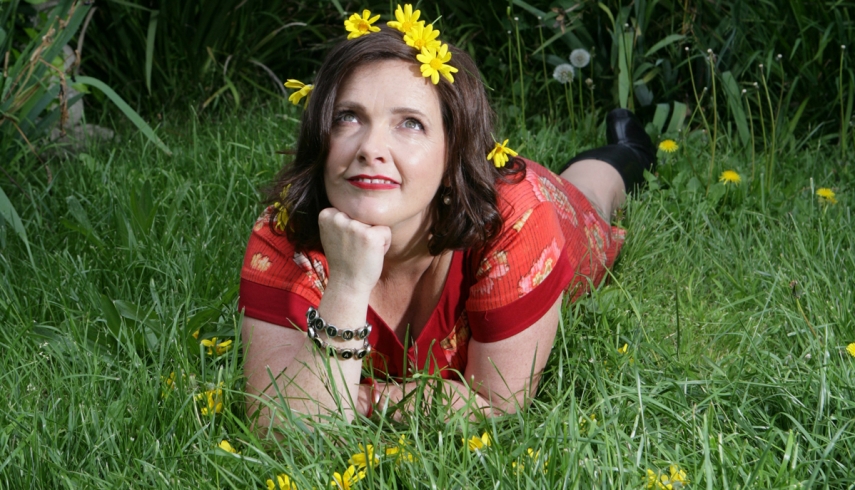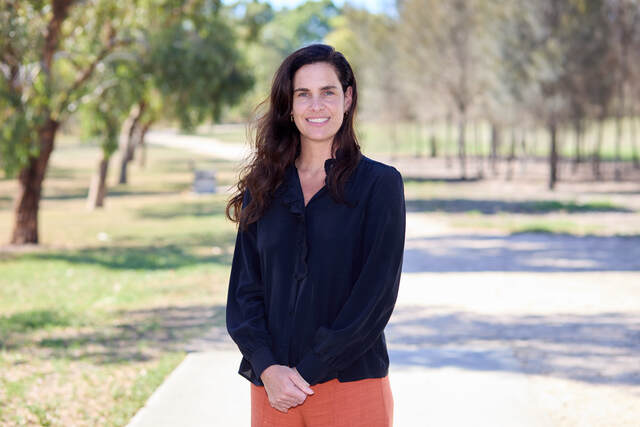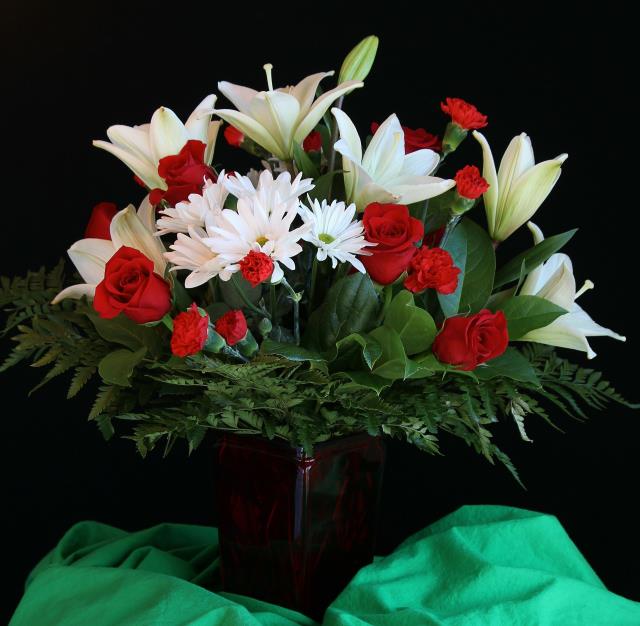Some think she’s brave and honest. Others say she’s a one-woman offending machine. Alana Schetzer meets the woman behind the reputation
Catherine Deveny is a Melbourne writer known across Australia for declaring that God is bullshit, women who take their husband’s surnames are stupid and that monogamy is a crock.
Although we know an awful lot of what Deveny thinks, it’s rare that she gets to tell her own story. Other writers – not to mention politicians, members of the clergy, shock jocks and anyone who owns a Ralph Lauren polo shirt – are keen to paint the 44-year-old mother of three as ‘‘acid-tongued’’, ‘‘controversial’’ and ‘‘provocative’’. But according to the woman herself, she’s just ‘‘singing from her heart’’.
‘‘I’m a mum, a partner, a cyclist, a friend,’’ she says, sipping black tea in her Coburg kitchen. ‘‘Basically, all I try to do in life is get to the best possible place with the least possible damage and I’ll stand up for what I believe in. I could not give a f–k what people think.’’
Words are Deveny’s stock-in-trade, a trade she spruiks through newspaper columns, social media, writing workshops, radio gigs, stand-up comedy, guest spots on ABC’s hugely popular Q&A and, earlier this year, a stint on SBS’s critically acclaimed series Go Back to Where You Came From, on which she caused something of a sensation.
Deveny’s latest project is The Happiness Show, her first novel but not her first book. She has three others under her belt: a trilogy of newspaper column best-ofs, It’s Not My Fault They Print Them, Say When and Free to a Good Home.
Deveny’s signature style of eye-watering honesty sprinkled with humour is evident throughout her new book. It’s about Lizzie, a Brunswick mother-of-two and stand-up comedian who’s happy with her lot, including her partner, Jim.
Days before Christmas, the BBC invites her to London to discuss turning her one-woman show into a television series, which sets her on a collision course with Tom, a man from her past who’s her ‘‘unfinished business’’. Although they’re both in happy relationships, Lizzie and Tom rekindle their love match.
Deveny says she wrote the novel 10 years ago and never meant for anyone else to read it, let alone publish it. The story is partially based on her own experiences, but somewhere during the writing process the characters took on lives of their own, she says. ‘‘I wrote it when my son Charlie was born, and I sat over there (pointing to her plush couch), under the ceiling fan, wearing a sarong and breastfeeding a baby. And this book just came to me,” she says.
‘‘I was compelled to keep writing it because I wanted to find out what happened at the end of this story. I’d never written a novel before and I still don’t see myself as a novelist. At the time, I just kind of put it away and didn’t think about it.
‘‘I knew the major publishers were after books about the harried, working mother who has a husband who doesn’t understand her, he can’t be left alone with the kids, she wants to eat ice-cream more than have sex; and that wasn’t my experience and that wasn’t the kind of book I wanted to read at all.’’
The relationship between Lizzie and Tom may be confronting and their actions hurtful, she says, but they are typical of human nature.
‘‘The book is about different forms of love and challenging what’s considered normal when it comes to relationships,’’ she says.
Love is complicated, says Deveny. Long-term heterosexual monogamy is not a realistic expectation for many people, she says, and she’s baffled as to why this continues to be defined as ‘‘normal’’.
‘‘The nuclear family started when the life expectancy was 35,” she says. “We’re now talking about 85. How many decisions do you make in your 20s or 30s that are still going to be practical or suitable 20 years later?
‘‘We seem to be coping very well with the fact that technology changes; we’ll probably move suburbs, we’ll probably have lots of different jobs, but we don’t seem to be as good as adapting to reality of what modern relationships truly are.’’
Even before its launch, the book has generated interest from film and television producers, something Deveny is clearly pleased about. But she’s adamant she would never want anyone to change the ending.
‘‘One of the things when you have relationships going on in books is you have a ‘passion and regret it’ moment or they don’t do it and they regret it, but this book is not that,” she says. “This is a very modern love story and I think some people will find it very confronting.’’
Deveny grew up in Reservoir, an ‘‘awful’’ place where racism, homophobia and misogyny flourished, she says. ‘‘I never felt like I fitted in. People weren’t happy; they were bitter and had chips on their shoulders,” she says. “I wanted to live a life of happiness and not obligation. There were so many things we had to do and I still don’t understand why, because they were not nourishing.’’
Apart from time spent travelling, Deveny has always lived in Melbourne’s north. When she moved out of home, she took up residence in several Fitzroy sharehouses, studied cinema and drama at La Trobe University and got her first big break, writing for Tonight Live with Steve Vizard.
She’s now settled in Coburg, in a home she shares with her three sons, Dominic, 14, Hugo, 11, and Charlie, nine, boyfriend Anthony Artmann, two boarders and an overly enthusiastic Jack Russell-cross called Archie.
Her open-plan kitchen and family room has a warm, lived-in atmosphere, with photos and other personal items scattered throughout. In one corner are several guitars, used for impromptu family performances. From the back verandah hangs a bright yellow sign that reads ‘‘atheist kabutz’’.
Deveny is fiercely proud, paid-up member of Melbourne’s north. In fact, it’s more akin to a love affair. When I ask what she loves about living in the area, she smiles widely as she says: ‘‘The mix of the migrants, the old Aussies, the student households, the psychopaths, the people from the eastern suburbs trying to get a bit of leftie cred.
‘‘I love the way sometimes people will leave things like free lemons out the front of their house for people to take. I love the posters, the graffiti, the radical knitting. It’s not one size fits all. It’s my spiritual home.’’
Deveny mentions the 30,000 who turned out in Brunswick last month to pay their respects to murdered Irish woman Jill Meagher, whose disappearance from Sydney Road on September 22 sent the city into mourning. Adrian Ernest Bayley, a 41-year-old Coburg man, has been charged with her rape and murder.
‘‘We all took to the street in quiet, peaceful protest and then we just went and had a coffee,’’ Deveny says.
Deveny became embroiled in an emotional firestorm when she revealed, during the week Meagher went missing, that she had been accosted earlier this year by a man she said matched the description of a man seen in CCTV footage.
When contentious News Limited columnist Andrew Bolt wrote about the situation, some claimed he was trying to lay some blame on Deveny for what happened to Meagher because she hadn’t called Crime Stoppers sooner.
Deveny calls the run-in ‘‘some stupid little incident with a dickhead’’.
It’s not the first time – nor will it be the last – that Bolt and other conservatives, including fellow News Limited columnist Miranda Devine and Sydney radio host Steve Price, have taken aim at Deveny. In fact, there seem to be two types of people – those who admire Deveny and support her for ‘‘sticking it to the man’’ and those who think she’s a one-woman offending machine.
In 2009, The Age dropped her as a weekly columnist after she infamously tweeted during a Logies broadcast that she hoped then 11-year-old Bindi Irwin got ‘‘laid’’ and that Rove McManus’s second wife, Tasma, ‘‘doesn’t die too’’.
When I tweeted her about writing this story, an account called Pray4Dev started following me. Its profile states: ‘‘Don’t hate Catherine Deveny. Pray for her. A woman and a mother. She deserves our love not our disgust. Pray for her. Pray for her children.’’
There are certain preconceptions of Deveny because of what she writes and says. She is aware of this, but says she ‘‘never lies down in the chalk outline that is drawn for me’’. The freedom to do what she thinks, when she thinks it, is liberating, she says. And she’s very grateful for it.
‘‘The word I get a lot to describe me, which I find odd, is ‘brave’. I don’t see myself as brave in the slightest,” she says. “I have never once tried to provoke or offend. This is just what I think. But people think that if they are provoked or are offended, then I’ve done that to them. No, no, no. Offence isn’t given, it’s taken and more damage is caused by taking offence than by giving it.’’
As I stand and prepare to leave, Deveny ducks out of her living room and a moment later returns with a colourful cotton bag full of self-inking stamps.
‘‘Would you like me to sign your book?’’ she asks.
Before I can answer in the affirmative, she grabs an oversized stamp and presses it against the opening page of my book.‘‘You can’t fake passion,’’ it reads.
You sure can’t.
The Happiness Show is published by Black Inc. The book will be launched by Julian Burnside at the Bella Union Bar at Trades Hall on November 8. Details: visit blackincbooks.com and www.catherinedeveny.com.







